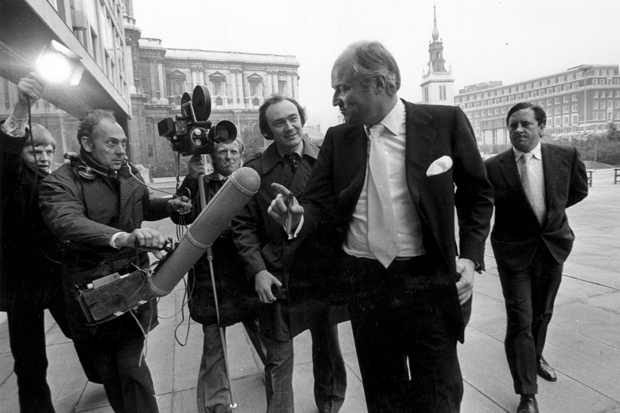The Goldsmith effect
Sir: Much as I admire filial loyalty, I cannot allow Zac Goldsmith’s article about his father to go uncorrected (‘My dad saved the pound’, 28 February). Sir James Goldsmith was a formidable campaigner against the European Union and the euro currency, but at no point did he alter government policy. Zac Goldsmith suggests that I did not offer a referendum on membership of the euro currency out of conviction. This is wrong. I believed that any decision to abandon sterling — which I myself did not favour — was so fundamental that it would need national endorsement. On constitutional grounds some Cabinet members dissented, but many will confirm that I was seeking agreement for such a policy long before the Referendum party was founded. If anything, Sir James made the decision process more difficult, since no one in Cabinet wished to appear to be influenced.
It has been claimed that I was willing to offer a referendum on membership of the EU. This is untrue, although Sir James often cited it as a reason for establishing the Referendum party. Zac Goldsmith suggests that I offered Sir James a peerage, presumably in order to secure his support. At no time did I make such an offer; nor did I authorise anyone else to make such an offer on my behalf. Quite apart from any other consideration, it would have been wholly improper.
Sir James was not, however, without influence. The Referendum party did serious damage to the electoral prospects of the Conservative party, and helped usher in 13 years of Labour government. Sir James is entitled to take his share of credit for what followed as a result of his actions: the European treaties of Nice and Lisbon; the advent of spin on an industrial scale; financial collapse; rising unemployment and soaring national debt. What he cannot take credit for is keeping us out of the euro. The Conservative government I led obtained the opt-out at Maastricht, and ensured a referendum would be required for any currency change, thus spiking Mr Blair’s ambitions to join the euro.
I do not wish to reopen old sores, nor do I wish to cause any offence to the Goldsmith family. But, for the sake of historical record, I cannot allow such myths to take root.
Sir John Major
London SW1
Tate expectations
Sir: I am flattered by Jack Wakefield’s suggestion that I would make an ‘outstanding’ director of Tate Britain (Arts, 7 March). But I’d like to make it clear that I do not share his view of Penelope Curtis, who seems to me to be doing a good job under very difficult circumstances.
Insofar as Mr Wakefield’s criticisms relate to disappointing exhibitions, few surely would agree that Lord Leighton, Epstein or Lanyon are the answer; and his view that the ‘massive unseen collections present plenty of opportunity to mount outstanding exhibitions’ is idealistic. The conservation time required to bring most of these works up to exhibition condition would be prohibitive. Where his criticisms relate to a ‘decline in scholarship’, the decision to part with Ian Warrell and Annie Lyles undeniably was bad karma for Curtis, but as Mr Wakefield concedes, it was forced on her. Under Curtis, the Tate’s collections website, in terms of its scholarship, has become one of the best there is.
Many of Tate Britain’s problems result from the public perception of its relationship with Tate Modern, from Tate’s unwieldy management structures, and of course from the squeeze on public funding. Penelope Curtis works with the people who raise funds for Tate and manage its image, but she does not control them. Has Tate Britain now become the cultural equivalent of Manchester United — someone has to take the rap for a few poor results?
Alex Kidson
Liverpool
Rank hypocrisy
Sir: Martin Vander Weyer is right (Any other business, 14 March). Rona Fairhead should not for a second consider resignation as chairman of the BBC Trust on dubious grounds at the behest of Margaret Hodge, Labour chairman of the Public Accounts Committee. There is rank hypocrisy here. In 2003 Lady Hodge refused to resign as Children’s Minister despite the revelation that year of the Islington care homes child sex abuse scandal, which happened on her watch. Lady Hodge had been leader of Islington council at the time the abuse took place but it had been brushed under the carpet. Initially, Lady Hodge dismissed the scandal as gutter journalism. Later she blamed it on her officials. Finally, through her barrister, she apologised. So much for taking responsibility.
Gregory Shenkman
London W8
A philistine proposal
Sir: Your claim (Leading article, 14 March) that ‘Britain’s arts have never been in better shape’ is untrue: the numerous arts organisations damaged or destroyed by George Osborne’s spending cuts are memorialised by the website ‘Lost Arts’. The axing of state funding altogether, which you advocate, would be as deplorable as Isis’s bulldozing of Iraq’s historic sites.
T. Simon Couzens
London N4
The EU and Russia
Sir: Peter Hitchens tries hard to equate the European Union and Russia as comparable imperial powers (‘The empire-builders’, 7 March). But the difference is that the Russian loss of 700,000 square miles was at the desire of subject peoples, whereas the enlargement of the EU by 300,000 of those square miles was by the free will of some of those formerly subject peoples.
Roger Broad
London W2






Comments